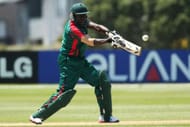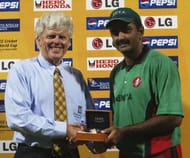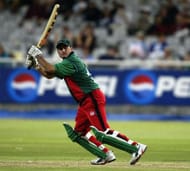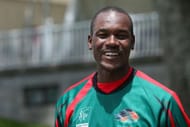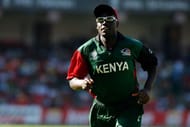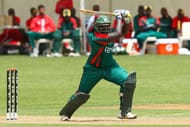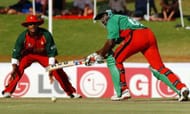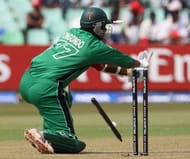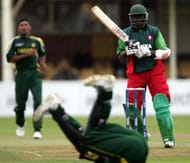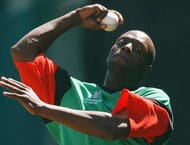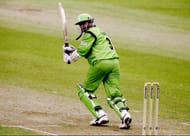The 2003 ICC World Cup campaign was a disappointing one for India despite doing very well to reach the finals. It was heartbreaking to watch the team crumble in the face of the mighty Aussies against whom India lost their only match in the group stages en route to the final. For the associate member team Kenya, however, the ride was a little different.
Becoming the first non-test playing nation to reach the semi-finals of a World Cup, the Kenyan team had a dream run losing to South Africa and West Indies in the group stages and getting past New Zealand, Canada and Sri Lanka to ensure a place in the knockout rounds. Their fairy tale progress came to an end when the Indian cricket team denied them a win and consequently, their chance to play in the final.
The match was a noticeably one sided one with only captain Steve Tikolo putting up any resistance to the dominating Indians. We take a look at where the members of this team, one that brought unparalleled glory to their nation, are at present.
1. Steve Tikolo
It has often been speculated that Steve Tikolo as a player was probably too good for Kenya and deserved a country far better suited to accommodate his brilliance. Widely hailed as the best player Kenya produced, Tikolo captained this Kenyan side in the 2003 ICC World Cup and led them further than anyone expected them to go.
In his final game in the tournament against India (following which Kenya was knocked out), Tikolo registered a score of 56 off 83 balls which included five fours and two sixes.
The batsman completed a hundred appearances for Kenya in 2007 and in 2008 and captained the Eastern Aces team in his country's domestic tournament. His last appearance as Kenya captain came in the 2010 ICC World Cup qualifiers after which Tikolo walked out on his team having successfully secured a place in the 2011 World Cup.
In 2013 he was coach of the Kenyan U19 national side and was named interim coach of the senior side replacing Robin Brown. Tikolo continued his coaching role and In 2016, he was appointed head coach of the Ugandan national cricket team.
2. Aasif Karim
Aasif Karim was probably one of the most dynamic members of the squad perhaps second only to Steve Tikolo and also the most experienced member of the squad. He retired after the 1996 World Cup but was persuaded to return in 2003 on account of his experience.
He was one of the best performers of the squad, doing particularly well in the Super Sixes match against Australia. The Aussies so far had seemed unshakeable but for the first time, Karim with his figures of 8.2-6-7-3 against them provided a bit of challenge. Though Austraila ultimately won that match, it was Karim who received the MOTM award.
Karim also represented Kenya in the Davis Cup in Tennis in 1988 and he retired for good after losing the semi-final against India in 2003.
3. Hitesh Modi
A left-handed batsman, Hitesh Modi was named the captain for a brief period of time for the senior international squad following contract disagreements between a lot of players and Kenyan cricket.
Hitesh Modi is the umpire Subhash Modi's son and they have the unique distinction of being the only father-son pair to appear in the same cricket match (in Nairobi against Bangladesh in 2006) which was his last ODI representing Kenya.
4. Collins Obuya
The 2003 run in the World Cup was an amazing one for Obuya who picked up a total of thirteen wickets in the tournament with an average of 28.76. In this tournament, he also achieved a career best with figures of 5 wickets for just 24 runs in the group stage match against Sri Lanka.
Post the World Cup, he played a year of county cricket with Warwickshire which, unfortunately, ended disappointingly as he failed to make a mark for his team. His career post-Warwickshire suffered a serious drop due to several health issues including an enlarged appendicitis which caused him to miss the 2004 ICC Champions Trophy.
After several unsuccessful attempts at reviving his bowling abilities, Obuya gave up to train instead as a specialist batsman. He represented Kenya in the 2011 World Cup notching up an unbeaten 98 against Australia in the tournament and still is part of the Kenya team.
5. David Obuya
Brother of Collins Obuya, David was the wicketkeeper understudy to Otieno during the World Cup. In the match against India in the semi-final he didn't really do much with the bat.
David however, was a decent player for the Kenyan team and adapted his game to the newer T20 format but his career lasted only till 2012, where he played his last game for the national side against Italy in Dubai.
6. Thomas Odoyo
He played for Kenya in the 2004 ICC Champions Trophy and gave a stellar performance in Kenya's tour of Zimbabwe in 2006, the end result of which was a 2-2 draw. Thomas served as captain for the Sahara Elite League team Northern Nomads.
In 2012, Odoyo was appointed the assistant coach of the national cricket team of Kenya as well as the head coach of the U19 side and in March 2016 he was named the interim coach for the senior international team.
7. Maurice Odumbe
The year after the World Cup, Odumbe scored a career best of 207 against the team from the Leeward Islands. Things took a turn for the worst when In 2004, Odumbe was convicted by the ICC on allegations of match fixing. The enquiry lasted five months and in August that year, he was found guilty of accepting money from bookmakers and was consequently handed a five-year ban.
He expressed a wish a to continue playing even after his ban ended but could not get into the national side. Odumbe is currently involved with various fundraisers to provide shelters for AIDS-afflicted children in addition to being a radio broadcaster for cricket.
8. Peter Ongondo
In 2008, Ongondo was selected as captain for the Western Chiefs in the Sahara Elite League. He played County Cricket for two years at Chesham Country club in 2010 and 2011. His performances left the management of the club impressed.
After his first year in 2010, he was recalled to take his place in the team again in 2011. The Kenyan however, was unable to return for a third time in 2012 due to troubles with his visa. Ongondo was caught out by Zaheer Khan for a duck in the semi-final against India and played his last ODI for Kenya in 2011.
9. Kennedy Otieno
Brother of Collins and David Obuya, Kennedy Otieno was one of the players who faded away with time due to differences between the player and the board. From 1996-2006, Otieno represented Kenya in 71 matches missing only three games against West Indies.
Despite this, he was dropped from the 2006 Intercontinental Cup first class game which annoyed him to the extent of taking a decision to stop playing international cricket for Kenya. He is the current captain of the Southern Stars, a domestic league team but has not played for Kenya since 2009.
10. Martin Suji
After the 2007 ICC T20 World Cup, Suji was made assistant coach of the Kenyan national side. In 2011 he was made head coach of the Ugandan national team, a job in which he was assisted by Steve Tikolo. Suji scored 1 off eight balls in the semi-final, the last game for Kenya in that tournament and did not manage a single wicket to his credit.
His last match for Kenya came in 2006 against Bangladesh.
11. Ravindu Shah
Earlier in the World Cup, Ravindu Shah scored a 46 against India in addition to knocking up a half ton against Australia. Sadly, the semi-final was not as good for him as he stayed for a good seventeen balls scoring only 1 in that time.
Due to various injuries, Ravindu Shah's cricketing career went on backfoot after 2004. Four years later, however, he returned to the game showing exactly the same amount of vigour that he had back when he was a regular player. In his second game out of recovery, Shah went on to score his first ODI ton.
His last game for Kenya came in 2007 and subsequently, he retired at the age of 35.
Looking for fast live cricket scores? Download CricRocket and get fast score updates, top-notch commentary in-depth match stats & much more! 🚀☄️

